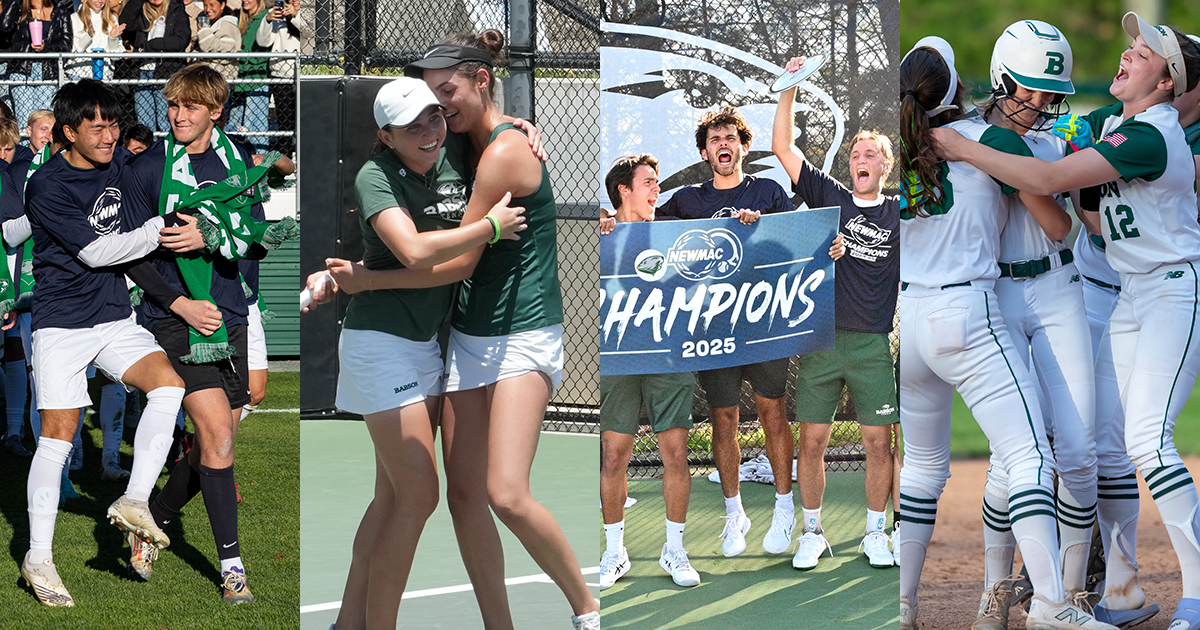When Students Teach Students to Lead with Integrity
Peer accountability and a real commitment to community standards is needed now more than ever, says Curtis Johnson ’23, Kevin Teeter ’21, and Alexa Tutecky ’21.
These student leaders, along with 20 of their peers, make up the student representatives on Babson’s Hearing Board, and are, this year, helping raise awareness of a modernized Code of Ethics and the importance of key ethical decision-making skills.
The Need for Peer Perspective
By definition, “Babson’s Hearing Board serves as an objective hearing body for both academic and nonacademic cases.” Appointed participants are “dedicated to educating and hearing out members of the community” on matters of academic integrity, conflict navigation, and behavioral change.
Yet, this long-standing Babson board has and will continue to bring much more to the campus community than sitting in on cases.
Updates to the Community Standards Office include a modernized Code of Ethics, and five student sub-groups meant to better serve community needs. The board is now more broadly focused on building ethical decision making among students—necessary for personal and professional success well beyond college.
“It’s great to be in this role because we’ve been able to talk about what ethics and community standards mean to us specifically as students,” said Kevin Teeter ’21, co-chair of the board.
“Going virtual presents new challenges, which also can present challenges with upholding ethical decision making. … So, updating our code of ethics and our approach will be really important going forward,” said Alexa Tutecky ’21, co-chair of the board.
“The role of a student leader is to set an example, to have integrity. … We’re looking to put our feet on the ground, virtually or not, and to lead by example.”
Kevin Teeter '21
This team, as well as others on Babson’s campus, including the POWS (Peers on Wellness), believe that peer-to-peer learning is key to positive change in college culture.
“To be a peer is to be someone, not even in the same age range, but the same interest range,” said Curtis Johnson ’23. “Being on the hearing board and keeping my peers accountable means … being in the same shoes as them, well equipped to help keep them accountable to the commitments they make as I keep those same commitments myself.”
According to Abigail Erle, director of community standards, these students were selected to help uphold community expectations, with particular focus on ways in which Babson students choose to engage, behave, and make decisions.
“I’m impressed largely by their dedication to the betterment of the institution and also the empathy and grace they show their peers,” said Erle.
What To Do, Not What Not To Do
Integrity. It’s a big part of Babson’s Code of Ethics and community expectations, and also is core to the College’s values.
Erle said that her team aims to make integrity more accessible among the Babson community.
“OK, yes ‘cheating, bad,’ ” she stated, “But, the shift in the way we communicate now is key: it’s not about what not to do, but how to go about your day as an ethically responsible person. It requires active participation and an understanding of your own values so you can act on them.”
A large part of their work this year will be focused on the community’s active participation in protecting one another from the spread of COVID-19, and addressing the racial injustices facing this nation.
“We are accountable to each other—to stick up for one another, speak up when necessary, be a support system, and maintain our strong community, even in a hybrid, virtual, and in-person environment,” said Tutecky.
Finding Fit, Purpose, and a Way to Give Back
All three students said they joined the board to give back. “I wanted to be able to provide my perspective as a student and as someone who believes in my values, integrity, and morals. … I would much rather go to a school where I can see the same values echoed around me versus one where they are not,” said Teeter.
“We are accountable to each other—to stick up for one another, speak up when necessary, be a support system, and maintain our strong community.”
Alexa Tutecky '21
Johnson, who now sits on the conflict navigation subgroup of the board, said he hopes to “focus on improving culture by participating in small acts that build into something great. … I wouldn’t have the opportunities I now have without the people and infrastructure Babson has built around me,” shared Johnson. “And, I wouldn’t be at Babson at all without the scholarship I received from an alum. I feel I owe everything I have going for me right now to my Babson experience.”
Teeter touched on some of these ‘small acts’ and programming they have planned, including educating students on how to protest, to talk about politics, specifically about the upcoming election, really to confront anything considered controversial in a meaningful way.
“It’s about engaging across differences and having difficult dialogues,” added Erle. “This group will help shepherd their peers through intense worldwide issues in a way that is human and meaningful. We all have different viewpoints, but it’s how we choose to manage them, and respect others … that is how culture change happens.”
“I’m really, really happy with the direction we’re going and the energy new board members are bringing to the table,” said Teeter. “The role of a student leader is to set an example, to have integrity. … We’re looking to put our feet on the ground, virtually or not, and to lead by example.”
Posted in Community





